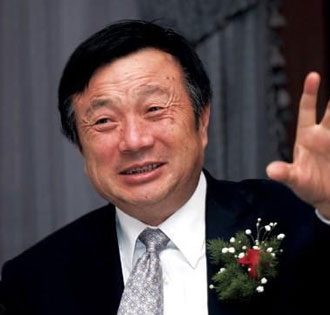Huawei Founder Tops List of China's Influential CEOs
By wchung | 07 Jan, 2026
Influential CEO: Ren Zhengfei has been named China's most influential business leader for the second straight year.
The founder of mobile infrastructure equipment supplier Huawei has been named China’s most influential business leader for the second year in a row by Fortune magazine. Ren Zhengfei, 67, was ranked ahead of Lenovo founder Liu Chuazhi and Haier Group CEO Zhang Ruimin.
Publicity-shy Ren has never given an interview to an international magazine. What little is known about Ren emerged in bits and pieces from numerous outside sources because the publicity-shy CEO has never given a personal interview to an international publication.
The recognition of Ren’s influence is based on his success in building a global telecommunications giant with $28 billion in 2010 revenues and counts as clients 45 of the world’s 50 top telecom providers.
Ren was born eldest of seven children in 1944 in the southwestern province of Guizhou. Both parents were middle-school teachers. Their ties to the Nationalist government prevented Ren from becoming a member of the ruling Communist Party until 1978, long after he graduated from the Chongqing University of Civil Engineering and Architecture and became a technologist for a research branch of the People’s Liberation Army.
Ren was recognized by the PLA as an outstanding worker responsible for various technical achievements. He retired from the army in 1982 with the rank of major amid a large-scale downsizing. He moved to Shenzhen and began an electronics company which ultimately led to the founding of Huawei Technologies in 1987. The $3,000 with which Ren funded the venture proved sufficient thanks to Ren’s PLA contacts which helped the company secure orders for communication technology from the military. In 1993 Huawei also became a networking equipment supplier to the mobile telephone market.
Today Huawei is not only China’s largest telephone-network equipment maker but also the world’s second largest supplier behind Ericsson. The company has 110,000 employees worldwide and made the Global Fortune 500 list for the first time in 2010.
Ren’s ties to the PLA has created some obstacles to Hauwei’s overseas expansion plans. In 2008 the US government refused to approve its proposed purchase of digital networking equipment maker 3Com. It has also been disqualified from supplying equipment to the Indian government. The Australian government has also blocked it from bidding on contracts on its national broadband network project.
Despite Ren’s position as China’s most influential executive, he is far from being one of China’s richest. He owns only 1.42% of Hauwei shares. His relatively paltry net worth of 935 million yuan ($148.2 mil.) places him at only 162nd on the 2011 Forbes list of China’s wealthiest.
Ren is know for having embraced Mao Zedong’s management philosophy which CNN once described as including the “Cleverness of a Wolf Organization Plan” and “the Principle of Suppressing.”
“Like China’s former leader, Ren Zhengfei is known for spouting folksy witticisms, purging associations and challenging US power,” Time magazine said of Ren.
Another of Ren’s characteristics is the prominence of family members in his management structure. Daughter Meng Wanzhou is an executive director and the company’s chief financial officer. Brother Ren Shulu is on the supervisory board. In late 2010 several top executives were rumored to be stepping down because Ren wanted son Ren Ping to succeed him as Huawei CEO. The company quickly quashed the rumor. Ren’s desire to keep business control in the family may have been prompted by a former executive Ren had considered a possible successor until he left Huawei to form a rival company.
Ren has good reason to think about succession. Late last year Ren revealed in an internal memo that he had undergone cancer surgery twice during the past few years and planned to step down as CEO but stay on as company president. He also announced a new system in which top executives would take turns serving six-month terms as CEO. Ren hasn’t announced an intention to retire but feels the system would keep Huawei from being dominated by one person and ensure a number of qualified successors.

Ren Zhengfei founded Huawei Technologies in 1987 with $3,000 in capital.
Articles
- Hyundai Motor Shares Jump 15% on Possible Nvidia Tieup
- Lenovo-Nvidia AI Cloud Gigafactory Unveiled at CES
- Storied 92-Year-Old Orthodox Jew to Preside Over Maduro Trial
- 1st Appellate Circuit Affirms Block of Trump Efforts to Cut NIH Funding
- Meta Delays Ray-Ban Display Deliveries Internationally on Strong US Demand
Asian American Success Stories
- The 130 Most Inspiring Asian Americans of All Time
- 12 Most Brilliant Asian Americans
- Greatest Asian American War Heroes
- Asian American Digital Pioneers
- New Asian American Imagemakers
- Asian American Innovators
- The 20 Most Inspiring Asian Sports Stars
- 5 Most Daring Asian Americans
- Surprising Superstars
- TV’s Hottest Asians
- 100 Greatest Asian American Entrepreneurs
- Asian American Wonder Women
- Greatest Asian American Rags-to-Riches Stories
- Notable Asian American Professionals

